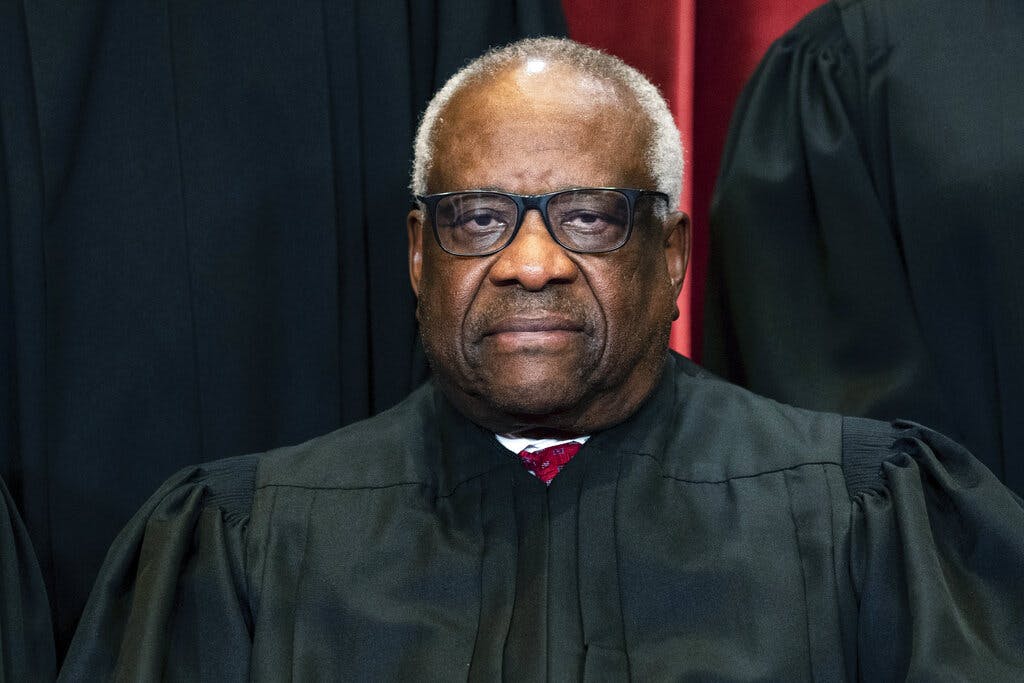At Least One Justice — Clarence Thomas — Appears Open To Disqualifying Jack Smith From Prosecuting Trump
The court’s senior justice took notice of an argument that could put the special counsel’s tenure in jeopardy.

Almost no journalists picked up on Justice Clarence Thomas’s question, put from the high bench during the Supreme Court hearing in the January 6 case, about whether President Trump may challenge, on constitutional grounds, the qualifications of the special counsel. Yet the poser suggests that at least one member of the Supreme Court is watching the issue.
Awake, we say. Justice Thomas’s inquiry came in oral arguments in the case of Trump v. United States. The high court’s most senior member, who is known for rarely asking questions, inquired of Mr. Trump’s attorney, John Sauer, if “you, in this litigation, challenge the appointment of special counsel?” Justice Thomas must have seen the issue marked in an amicus brief by two former attorneys general supporting Mr. Trump, Edwin Meese, 92, and Michael Mukasey, 82.
Mr. Sauer answered, “Not directly.” He added, though, that Mr. Trump’s lawyers “have done so in the Southern District of Florida case, and we totally agree with the analysis provided by Attorney General Meese and Attorney General Mukasey.” Those eminences argue that Mr. Smith assumed his position in violation of the Constiution’s appointments clause.
That clause ordains that the president “shall nominate, and by and with the Advice and Consent of the Senate, shall appoint Ambassadors, other public Ministers and Consuls, Judges of the supreme Court, and all other Officers of the United States,” but that “Congress may by Law vest the Appointment of such inferior Officers, as they think proper, in the President alone, in the Courts of Law, or in the Heads of Departments.”
The brief appealing to that clause is docketed before Judge Aileen Cannon in the Mar-a-Lago case and the Supreme Court in the January 6 one. In it, Generals Meese and Mukasey, joined by two professors, Steven Calabresi and Gary Lawton, argue that Mr. Smith’s appointment is invalid because he was not nominated by the president and confirmed by the Senate.
Mr. Smith was appointed not by President Biden but by Attorney General Garland. Unlike, say, Robert Hur, the special counsel who investigated Mr. Biden, Mr. Smith was not already serving in the Department of Justice in a Senate-approved role. He was prosecuting war crimes at the Hague, a position that demands no senatorial scrutiny. He was a private citizen, not a public servant confirmed by the Senate.
The challenge to Mr. Smith’s appointment notes that Mr. Smith “wields tremendous power, effectively answerable to no one, by design. And that is a serious problem for the rule of law — whatever one may think of former President Trump or the conduct on January 6, 2021, that Smith challenges in the underlying case.”
Mr. Sauer echoed this position in court, telling Justice Thomas of the “extraordinary prosecutorial power being exercised by someone” — that’s Mr. Smith — “who was never nominated by the president or confirmed by the Senate at any time.” The reference to the Sunshine State reminds Justice Thomas that Judge Cannon is yet to rule on the challenge, one of many filed by Mr. Trump.
Mr. Smith argues that his appointment passes constitutional muster because he is an “inferior officer” under the terms of the Appointments Clause. That means he can be named to his position by the “Heads of Departments,” one of whom is General Garland. The special counsel emphasizes that he can be fired and that the attorney general oversees his work, if not on a day-to-day basis.
That does not sway the amici, who write that nothing “remotely authorized the appointment by the Attorney General of a private citizen to receive extraordinary criminal law enforcement power under the title of Special Counsel.” They maintain that he is a superior officer, and therefore needs Senate confirmation or a congressional statute expressly authorizing his appointment.
Mr. Smith leans on the Supreme Court case, Morrison v. Olson, which upheld the predecessor to his office, the independent counsel, as constitutional. Only Justice Antonin Scalia dissented. Storm clouds, though, could be gathering over that precedent. During those same oral arguments at which Justice Thomas posed his question, Justice Brett Kavanaugh called it “one of the Court’s biggest mistakes” and a “terrible decision.”

